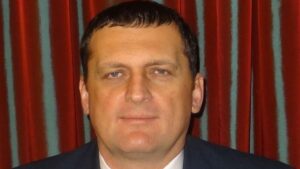
From 30% to 60% of Ukrainians have not had contact with a family doctor or been examined during the year, and the state should develop mechanisms for reimbursement of research and analysis under the Health Insurance Program (HIP).
Serhiy Kutsevlyak, PhD in Medicine, Master of Public Administration, told Interfax-Ukraine that this is evidenced by the results of the analysis of the monitoring of the medical information system (MIS) data, as well as a patient survey conducted in one of Kyiv’s primary healthcare centers in May-July 2023.
“We analyzed how many patients have never seen their family doctor: not a single appointment, not a single referral, not a single prescription, not a single sick leave, not a single certificate, that is, zero activity during the year for a person who has a declaration with a family doctor. In the agrarian rural region, we saw about 30% of such patients. And in the central region, we counted up to 60% of people who have never seen a family doctor,” he said.
At the same time, referring to the monitoring of MHI data for 2019-2021, Kutsevlyak noted that “a lot of people simply do not visit family doctors, which logically leads to high mortality rates, in particular from cardiovascular diseases (CVD), and high rates of disability after heart attacks and strokes.”
He said that in the summer of 2023, a pilot project was implemented in one of Kyiv’s primary healthcare centers, during which the clinic conducted cardiac examinations and tests in 500 people aged 40-65.
“They found 41% of people who need in-depth attention and corrective therapy. That is why we are now talking about forming a state policy so that the state provides a minimum set of tests for the patient to ensure consumables for the study,” he said.
Kutsevlyak noted that, according to preliminary calculations, the cost of implementing the project for monitoring the health status of residents of a city with a population of about 250 thousand people could be about UAH 80-90 million.
“We are saying that the state should introduce reimbursement for examinations to be able to motivate and control family doctors. It is clear that family medicine will not be able to do this with the current level of payment per patient, so the state should shift its focus to have this opportunity,” he said.
Kutsevlyak emphasized that the implementation of preventive medicine projects in the context of war is becoming even more important.
“Not only does the war affect mortality, but we lose tens of thousands of people at the front, and in the rear we lose hundreds of thousands of people from undiagnosed diseases. Therefore, we need to shift the emphasis to monitoring the health of a particular citizen, so that an increase in healthcare funding by billions will have an effect and save tens of billions across the country,” he said.
Kutsevlyak clarified that he had initiated the development of a corresponding state program aimed at intensifying the work of the primary healthcare system in the area of preventive medicine, in particular, at encouraging primary healthcare doctors to monitor the health of patients who have declarations with them.
According to the expert, “all state investments over the past 10 years have been spent on stands, contrast, angiographs, CT scans, and other equipment, but there is no timely basic diagnosis and timely identification of risk factors that lead to disease.
“The problem of timely diagnostics to identify risk factors remains relevant. High-tech equipment, such as CT scanners and angiographs, cannot be effectively used without systematic mass screening of working-age residents,” he said.
Kutsevlyak noted that many Ukrainians face a lack of regular medical check-ups. At the same time, the shortage of doctors, especially in remote regions, as well as economic and socio-cultural factors, can cause delayed or complete neglect of medical examinations, which is especially important for the elderly and rural residents.
“Today, there is a problem of patients seeking treatment at late stages of disease. Unfortunately, the culture of check-ups and regular medical examinations is not well developed in Ukraine. Doctors have little interest in helping to diagnose and start treatment in time. We see great prospects for development if the state pays attention to this issue and starts directing doctors to work towards disease prevention,” Kutsevlyak summarized.
Kutsevlyak noted that “the emphasis should be on efforts at the primary health care stage.”
“Family doctors play a key role in timely diagnosis and prevention of diseases. The development of family medicine, advanced training of doctors and intensification of their interaction with patients can contribute to the early detection of risks and diseases,” he said.
In addition, according to Kutsevlyak, “we should pay attention to educational programs aimed at improving the medical literacy of the population, awareness of personal responsibility for their own health.”
“An informed patient will take more responsibility for his or her health and undergo regular medical examinations. It is necessary to intensify the work of the primary healthcare system and provide citizens with the necessary medical examinations for timely diagnosis. This will help reduce mortality and disability, and will be economically beneficial for the state. A 5% reduction in the number of strokes alone will generate an economic effect of at least UAH 1.5 billion per year, saving the lives and active working condition of 7.5 thousand Ukrainian citizens. Implementation of the principle of continuous monitoring of citizens’ health should become the basis of state policy,” he said.

Over 3.5 million Ukrainians have already chosen a family doctor, the Ukrainian Health Ministry’s press service has reported. A report posted on the official website of the electronic health system says that 3,643,778 people have already chosen a family doctor as of 21:00 on Friday, May 11. Patients selected a doctor from more than 20,000 specialists registered in the electronic health system.
The greatest number of declarations with doctors was signed in Kharkiv region – 404,500, in the city of Kyiv – 326,020, in Vinnytsia region – 298,754, in Dnipropetrovsk region – 282,835, and in Donetsk region – 267,681.